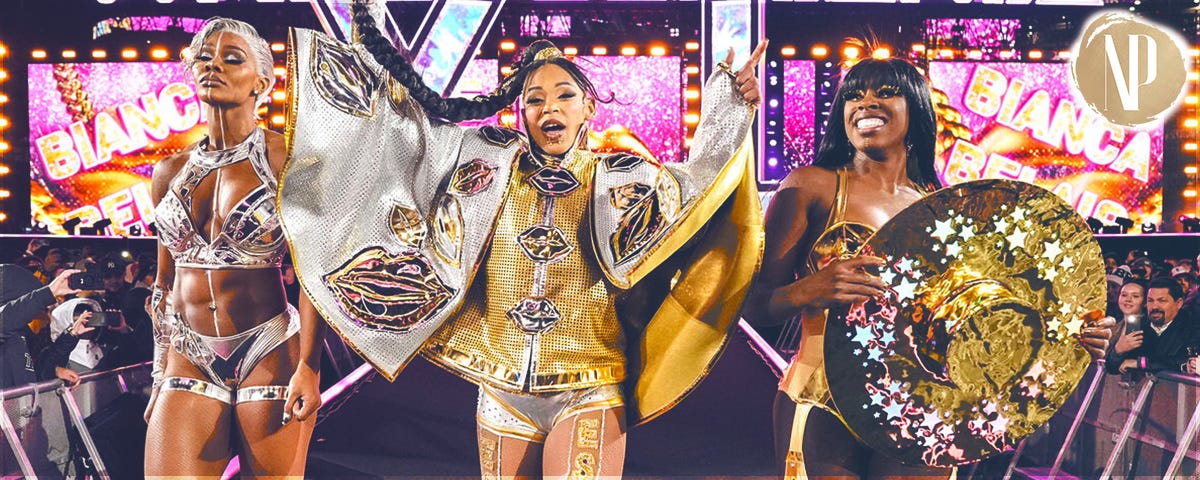These Women Put The "W" IN "WWE"
Let us celebrate the remarkable impact of these Black Women in wrestling entertainment

The recognition of Black women's enduring influence has too often been neglected, minimized by societal structures, and disregarded by those around them. The persistent oversight prompts an essential examination of the much-delayed acknowledgment of their fortitude—celebrated and unseen. Elevating the narratives of these women does more than merely inspire; it catalyzes the next generation, fostering a collective aspiration for a future where the principles of diversity and inclusion are not just token gestures but are ingrained as fundamental and transformative forces within our cultural and social fabric.
The recent rise of Black women in prominent entertainment venues, commanding substantial platforms, presents a paradox rich in promise and potential peril. On the one hand, these achievements can inadvertently confine their breadth of influence, reducing them to mere spectacles for public consumption. Yet, on the other hand, this visibility offers an extraordinary opportunity to showcase their singular abilities—whether excelling in the ring as professional wrestlers or competing as Olympians of the highest caliber. Through these displays, they might carve out a unique cultural space distinct from society's often narrow interpretations, which remain heavily influenced by entrenched norms of male hegemony.
However, while this burgeoning recognition brings much-needed visibility to a historically marginalized group, we must uphold the principles of equity, representation, and dignity. Our endeavors must remain anchored in a relentless pursuit of fairness and respect, consistently championing these values to reshape the prevailing narrative and advance a more inclusive cultural paradigm.
Black women deserve to be honored and celebrated for more than just their excellence; they should be acknowledged for shaping contemporary cultural paradigms and driving the momentum of societal change.
An intriguing example resides within the electrifying arena of WWE. In this domain, raucous live entertainment seamlessly melds with a reflection of contemporary social values and expectations, albeit through a hyper-exaggerated lens. WWE wields its cultural influence by showcasing a broad spectrum of performers, from herculean men to formidable women who, despite their prowess, are often diminished by formulaic narratives and monotonous promotional monologues delivered by marquee wrestlers. Amidst the constant evolution of talent, there has been a slow yet significant rise in Black women's representation within the ring and behind the scenes.
One emblematic figure is Naomi, known offstage as Trinity Fatu, who stands among the pioneering women of color to secure a spot on WWE's main roster and command the spotlight in their significant events. Over the years, she has featured prominently in various WWE offshoots and carved out a space within the Women's Division. Her vibrant, neon-lit persona not only captivates but also serves as a rare beacon in a space where such diversity remains unexplored and underrepresented.
A complementary force of undeniable impact emerges in the dynamic alliance of Bianca Belair and Jade Cargill, the reigning two-time tag team champions. Together, they have ingeniously redefined their titles as emblems of unwavering determination and cohesive collaboration, interwoven with distinctive qualities that set them apart in a crowded field.
Bianca brings an effervescent blend of flair, audacity, and exceptional athleticism, showcased through her spontaneous, high-flying feats—executed with the panache of flipping through the wrestling ring while adorned with oversized earrings and her signature, whip-like braid cascading behind her. Meanwhile, Jade embodies sheer resilience, formidable strength, and relentless perseverance, which is evident in her commanding presence and her arsenal of power moves that convey a potent physicality. Her aura is reminiscent of Storm, the revered Marvel superheroine, whose strength and grace exude authority and command respect. Together, they create a partnership not merely defined by titles but by an unparalleled synergy that captures the essence of individual brilliance and collective excellence.
Featuring these extraordinary women on nationally syndicated television programs, sold-out arena tours, Peacock specials, and cross-country events extends an invitation to other Black women to envision the unimaginable and to realize they need not struggle for a mere place at the table. Their presence must transcend their artistic talents, narrative prowess, and the confines of their professional personas or measurable achievements. Black women deserve to be honored and celebrated for more than just their excellence; they should be acknowledged for shaping contemporary cultural paradigms and driving the momentum of societal change.
From shattering barriers and exceeding the unattainable standards so often imposed upon them to pioneering trends reverberating throughout the culture—be it in hairstyles, fashion, vernacular, or beyond—these women serve as architects of what constitutes the modern American identity. Their impact is not confined to the wrestling ring or the stage; it extends far beyond into the very fabric of society, challenging conventions, and redefining norms in ways that inspire others to follow.
References:
Dunn, C. (2015). ‘Sexy, Smart and Powerful’: Examining Gender and Reality in the WWE Divas’ Division. Networking Knowledge: Journal of the MeCCSA Postgraduate Network, 8(3).
Hart, C. B. (2012). Ideological “smackdown”: A textual analysis of class, race and gender in WWE televised professional wrestling.
Jones, M. J. (2019). Grappling with Race: A Textual Analysis of Race within the WWE.




Have to say that I learned a very important perspective concerning this version of women’s entertainment. Love it!
Love it